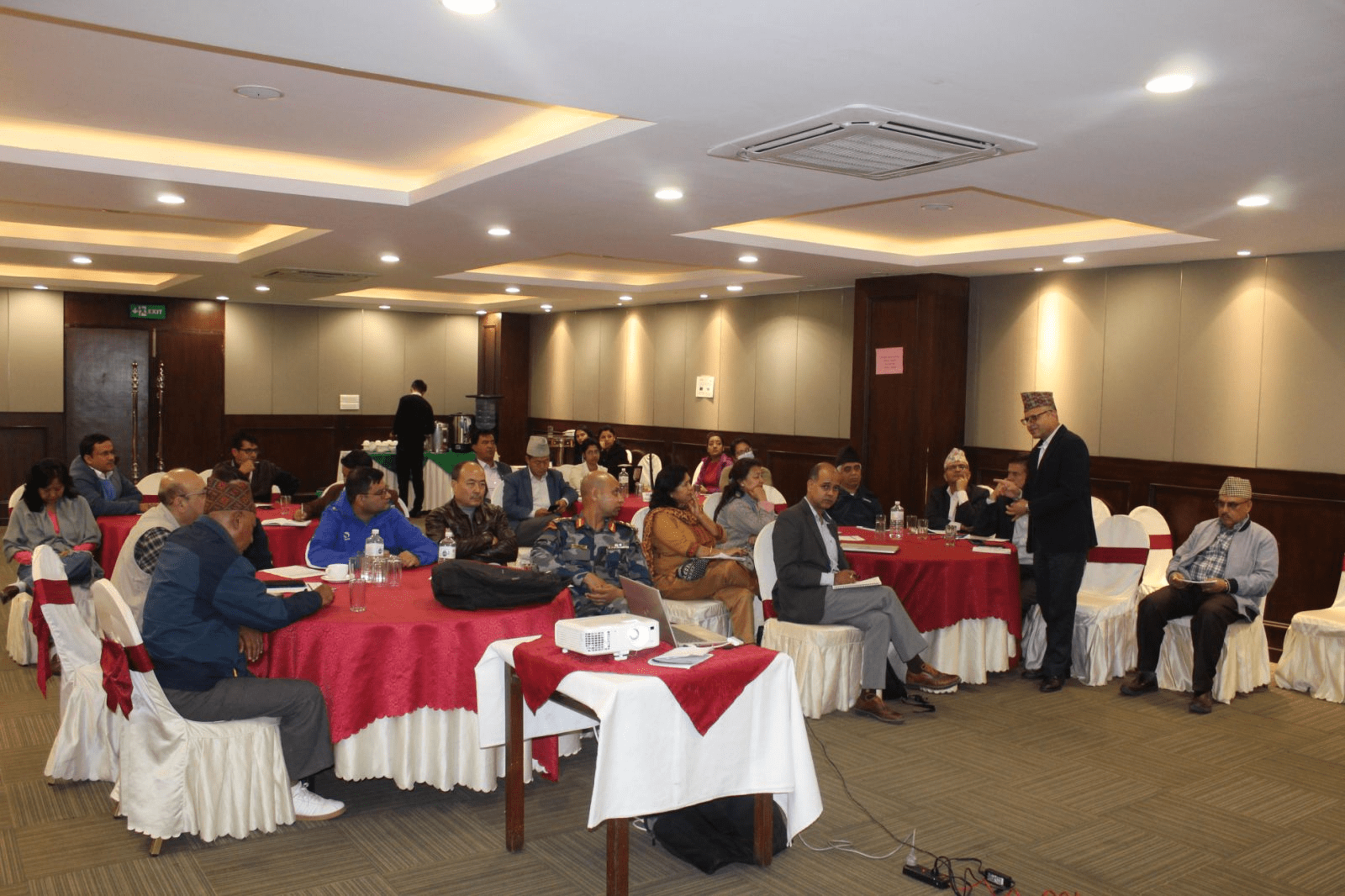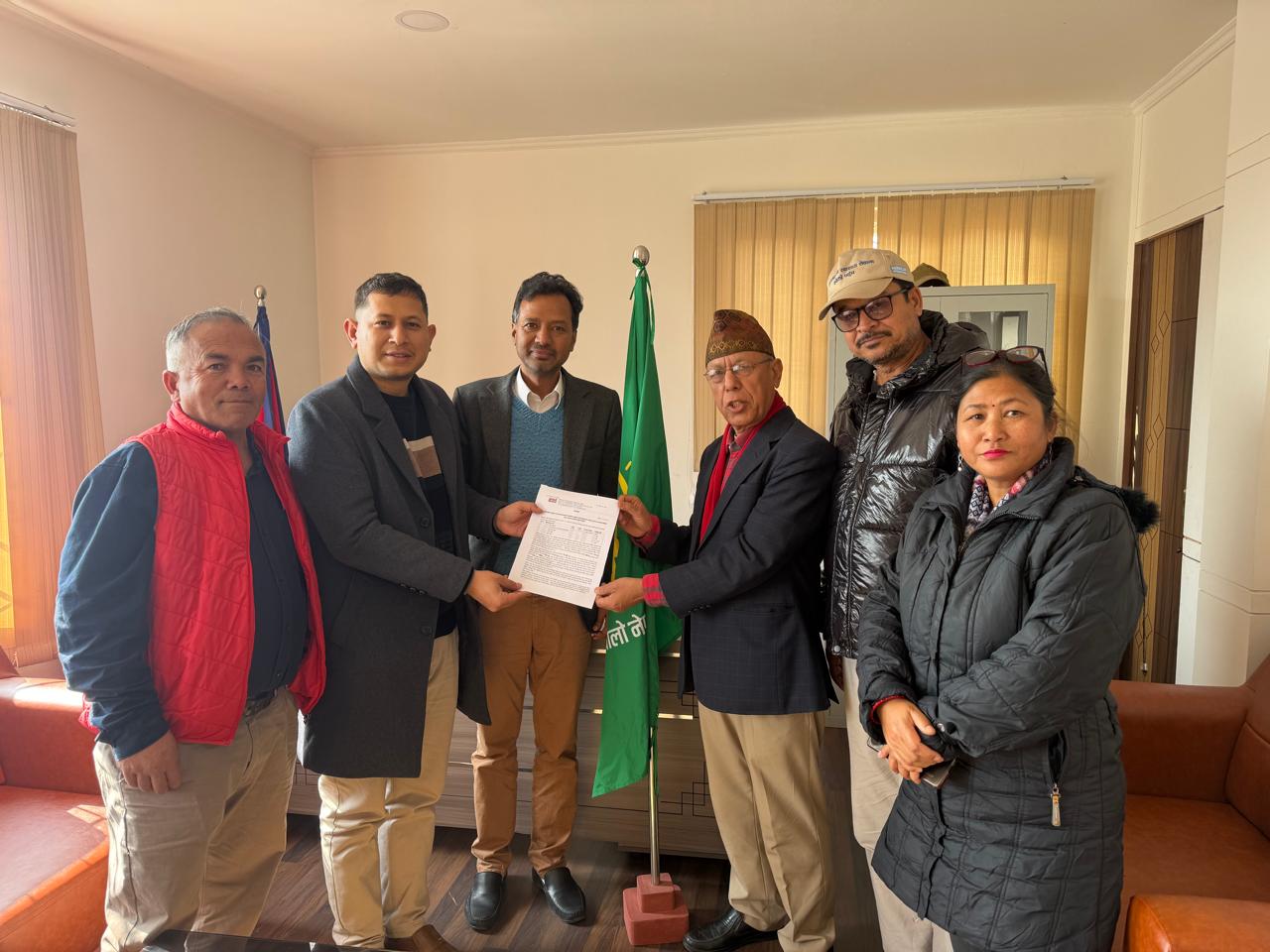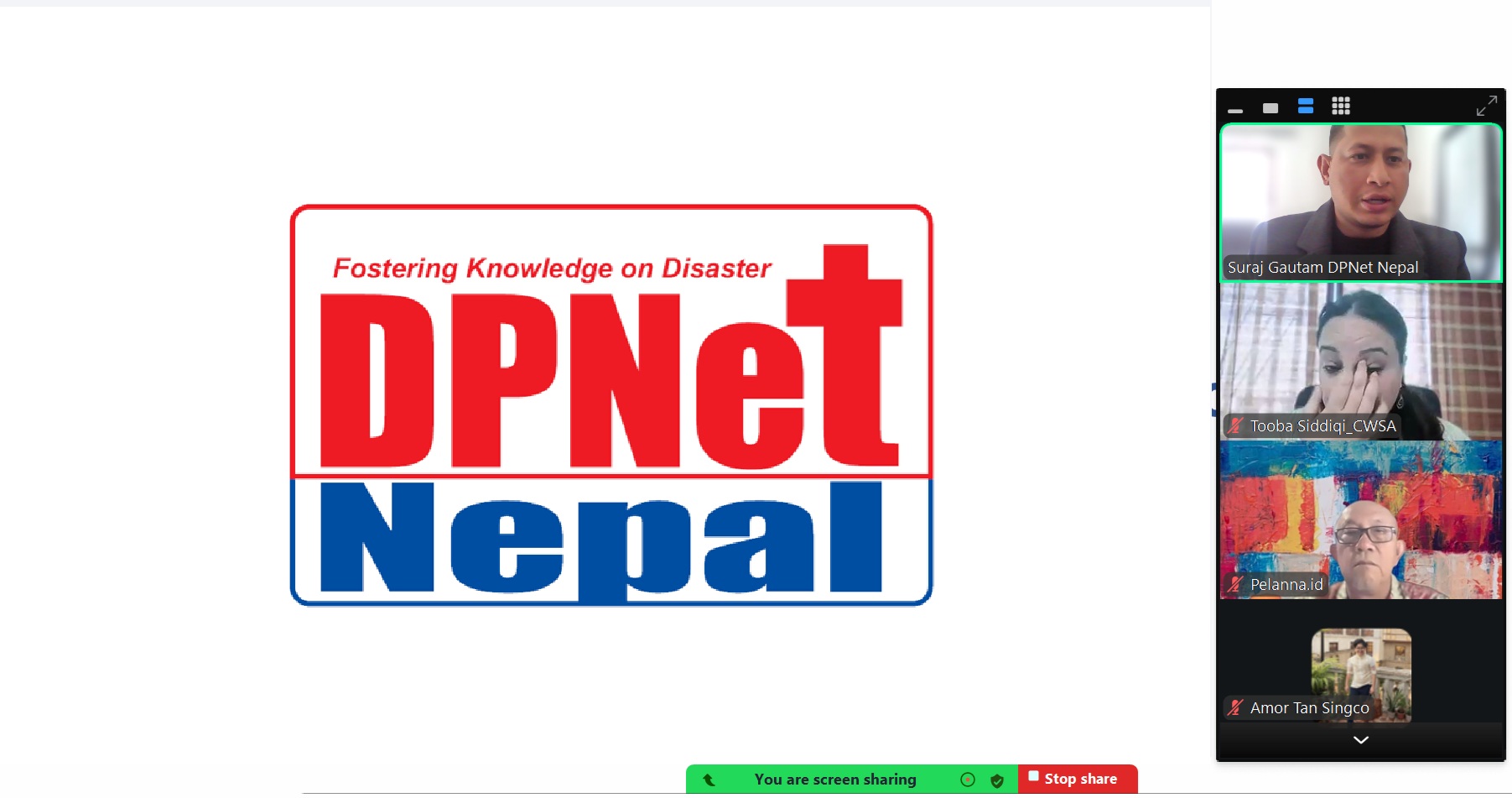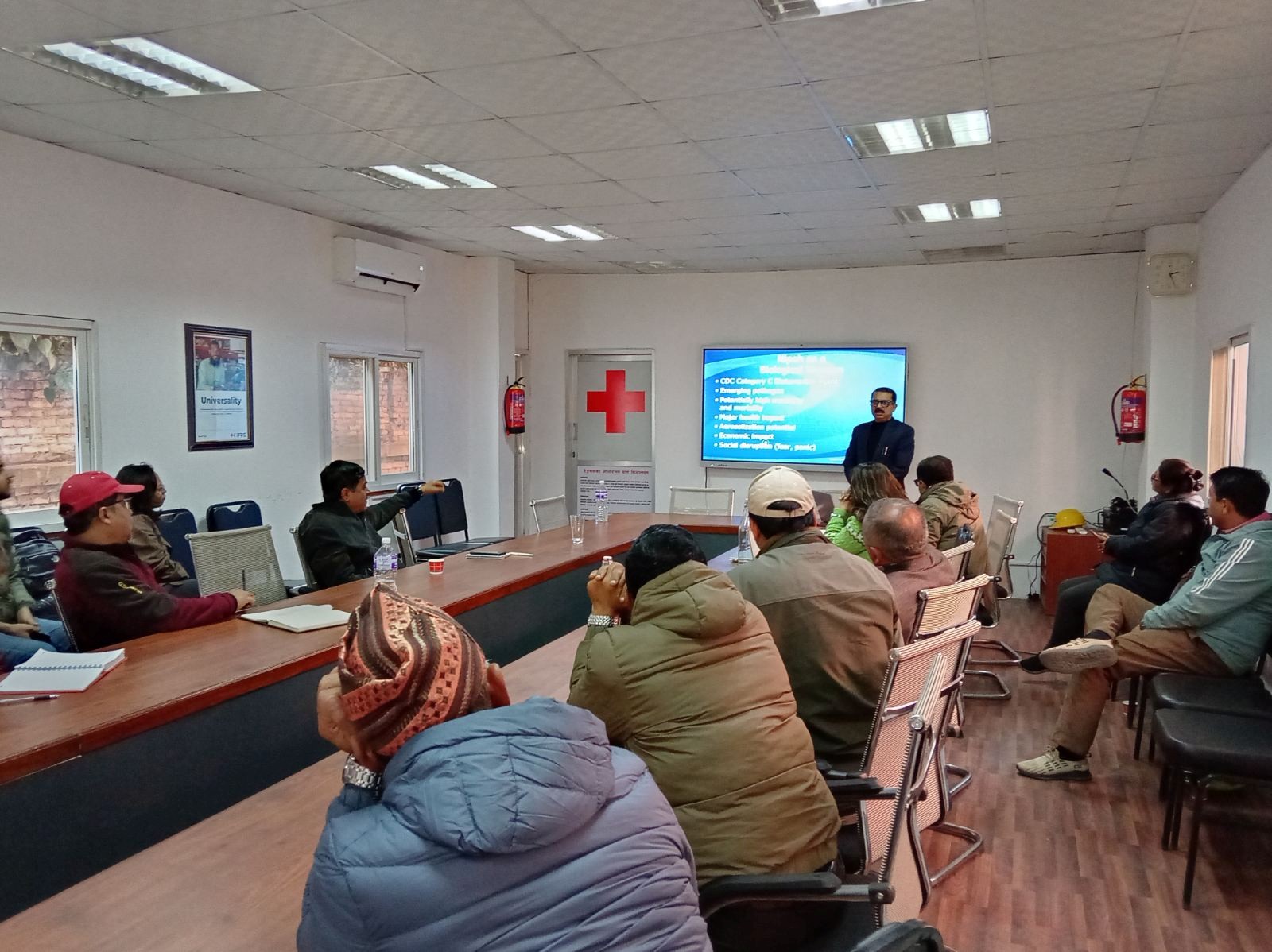SUDRIDH Project - Participatory Review and Reflection Workshop

On November 9, 2023, DPNet Nepal, in collaboration with USAID Tayar Nepal, organized the SUDRIDH Project-Participatory Review and Reflection Workshop. The event, presided over by Mr. Surya Bahadur Thapa, Chairperson of DPNet, featured discussions led by Mr. Kshitiz Paudel, Program Coordinator, highlighting the project’s phases and learnings. Guests including Mr. Tirtha Raj Joshi from USAID Tayar Nepal, Mr. Rishi Raj Acharya from MOFAGA, and Ms. Krishna Karkee from USAID Tayar Nepal, among others attended the event. Mr. Thapa expressed gratitude for Tayar’s support and acknowledged DPNet’s dedication to transparently achieving project goals. The event concluded with feedback for improvements and emphasized ongoing activities, such as earthquake response in Jakarkot and Bajhang, policy discussions, and coordination efforts. The event aimed to foster collaboration for future disaster risk reduction planning.
News in Detail:
On 9 November 2023, DPNet Nepal in collaboration with USAID Tayar Nepal, organized a Participatory Review and Reflection Workshop on the SUDRIDH project. Mr. Kshitiz Paudel, Program Coordinator at DPNet Nepal started the event with a brief highlight of the program, to discuss the learning throughout the phases of the project and look forward to a future pathway.
Mr. Surya Bahadur Thapa, Chairperson of DPNet presided over the event, which was attended by guests such as Mr. Tirtha Raj Joshi, Chief of Party, USAID Tayar Nepal, Mr. Rishi Raj Acharya, Under Secretary, MOFAGA, Ms. Krishna Karkee, Disaster Preparedness and Response Specialist, USAID Tayar Nepal, representatives from Armed forces, media, and organizations working on disaster management.
Mr. Thapa gave welcome remarks and proceeded with the program remembering the deceased lives during the recent Bajhang and Jajarkot earthquakes. He emphasized the fact that DPNet has been working rigorously to achieve the project goals with utmost transparency, hence the event seeks feedback and suggestions from the participants as per their observation for further improvements. He openly thanked the Tayar team for their unwavering support and guidance because of which DPNet has been able to reach this far with its work in supporting the whole DRR sector as an umbrella organization. Along with this, Mr. Thapa highlighted the activities DPNet has been conducting at present namely, coordination and networking, quick response to Jakarkot and Bajhang earthquakes for situation analysis and reporting, and policy-based discussions. On behalf of the whole DPNet team, he gave a commitment to strongly work on networking and coordinating for enhanced DRR practices with CSOs, government, and agencies working on disaster, with an anticipation that the event would provide a base for future planning.
Mr. Kshitiz Paudel, Program Coordinator at DPNet Nepal shared his presentation titled “SUDRIDH Project: Learning from Program Execution and Future Planning”. His presentation took off with a brief introduction to the SUDRIDH project that started on the 15th of March 2023, the intention with what the project began, and moved further with the activities conducted, learning, and future planning. His presentation revolved around the learning throughout the project implementation and his observations as a Project coordinator on the parts where efforts can be made further and shared the future plans.
Mr. Paudel shortly gave a brief on the previous grant of USAID Tayar Nepal that led to the formation of NPDRR thematic groups and the establishment of platforms for knowledge sharing and discussion and that the present grant has been an assistance to strengthening the Disaster Governance System and DRRM capacity development at the federal, provincial and municipal levels. He highlighted that 8 national-level and 3 provincial policy dialogue programs have already been conducted under the project which has brought a common conclusion that even though numerous policies exist, the problem lies on the part of the implementation and coordination among the bodies working on disaster be it governmental, non-governmental or CSO’s. The PPDRR in Sudurpaschim province was established through continuous advocacy by DPNet central and provincial committees. Additionally, the Planning Commission in Gandaki province has collaborated with DPNet Gandaki Province, showcasing a lasting impact of our provincial-level initiation.
He further shared about the policy dialogues conducted under 7 themes, a review of those dialogues, and a national conference on DRR in detail; the dialogue on PSC brought recommendations to emphasize the pre-disaster counseling as preparedness to minimize the risks of sudden shocks, induced traumas, and mental health issues during and post-disaster, and the need to properly counsel the responders and workers during disaster stages. As a progress, DPNet has been incorporating the concerns of mental health and PSC in DRR on the sitreps of recent Bajhang and Jajarkot earthquakes. DPNet further plans to create a loose network with organizations working on mental health.
The learning gathered from the dialogue on EWS was the gap in reach and access to EWS among marginalized and vulnerable groups of people. He emphasized the need to work on the EWS mechanism considering the accessibility of people with disabilities and other marginalized groups. He highlighted that NAST has been making efforts for EWS after the recommendations from the dialogue. DPNet also discussed the essence of EWS during provincial-level programs and observed remarkable progress on EWS in Neelkantha municipality. DPNet further plans to facilitate the Provincial Government for an Early Warning System during the field level mentoring.
During the Policy dialogue on private sector engagement in DRR, concerns were raised regarding the lack of Private sector inclusion in decision-making, so the learning on the need to emphasize the role of the private sector in DRR. DPNet has progressed by ensuring the participation of the Private Sector in various programs organized by DPNet. As a way forward, DPNet plans to conduct MERS in collaboration with private sector organizations such as FNCCI work on member sensitization, and prepare business continuity plans.
Mr. Paudel underscored that throughout the discussion on Market System resilience, a gap in government policies to strengthen the market system along with a lack of resources was highlighted. He further shared that, DPNet has made efforts to cover the market functioning after disasters in the situation reports of the recent earthquakes in Bajhang and Jajarkot to assess the needs for the market to function well during and post-disasters. DPNet sees a prospect in working with a collaborative approach bringing together organizations working on market resilience such as Mercy Corps.
Mr. Paudel emphasized the need to focus on the overall aspects of risk transfer and financing, not just by concentrating on Insurance and providing access to the rural vulnerable areas too. He underscored the need to simplify insurance policies and programs to increase public engagement. Progress has been made by bringing up discussions on Provincial level forums and the Karnali Provincial government has already started with the disaster insurance policy “Mass Accidental Insurance Policy” through which 160 individuals have already benefitted. A future prospect Mr. Paudel shared is facilitating interaction programs between the government, National Insurance Authorities, Insurance Providers, and Private Sector organizations to identify the gaps and to expand DRR insurance in a collaborative approach.
While sharing the learnings collected from the dialogue on Multi-level disaster risk governance, Mr. Paudel stressed the need for the local government to wisely exercise the power and authority provided to them to enhance rescue, and relief efforts and utilize the existing infrastructures and entities. He underlined that DPNet has progressed by including the need for enhanced multi-level coordination gap in the sitreps prepared. He shared further plans for the conduction of Policy Research, gaps identification and contradiction between the laws of three tiers of government, and implementation of the policies after the gap research, and comprising province-level government to address the gaps.
Mr. Paudel moved forward to share the learnings from the dialogue on non-government engagement such as; the lack of meaningful participation and coordination among the three tiers of government. He emphasized the need to work on a collaborative approach forming a monitoring mechanism, and jointly taking along CSO and private sector organizations.
During the provincial events, the active participation of governmental authorities was observed during which Mr. Lal Bahadur Kawari, the Secretary, of MoIAL, Lumbini Province committed to taking forward the NPDRR and emphasized the need to enhance EWS in the province”, he shared. Also, in the Bagmati province, the need to specifically work on landslide EWS was emphasized. Hon. Ganga Narayan Shrestha, Minister of Internal Affairs and Law, Bagmati Province also suggested that the program would have been more effective if it had been conducted two months before the start of the fiscal year as it would help in the planning process.
During the sharing of the learnings from the NCDRR, Mr. Paudel underlined the need to engage academic partners to effectively conduct the program and continue the sustainability of the event. Regarding Knowledge sharing and information dissemination, DPNet’s ORC, an online library has been operational with a collection of documents under different categories such as research publications, legal documents, policy reviews, articles, SPHERE standards, and their translated versions consisting of more than 1400 documents. DPNet has planned to upload documents published by the Tayar Nepal partners and legal, and provincial documents. The virtual DRR platform is an online forum for discussions on upcoming concerns regarding DRR as a cross-cutting issue.
Mr. Paudel proceeded to share about the further pathway on DPNet’s functionality through the learnings from all the events, such as; creating loose networks of the themes generated, enhancing further efforts on EWS, policy reviews, and research comparing the three levels of government. Further, he put emphasis on knowledge exchange via the utilization of indigenous knowledge and sharing it at the regional level and implicating international experiences and knowledge for enhanced DRR practices.
Mr. Paudel concluded his presentation by thanking the valuable guests for their presence and handing it over to the Chair of the program Mr. Surya Bahadur Thapa, DPNet Chair.
Mr. Surya Bahadur Thapa, Program Chair and DPNet Chair shared about the four major working themes of DPNet Nepal, Policy advocacy, Knowledge sharing, Coordination and networking, and Research and capacity building, and highlighted the key practices ongoing at the present. He further spoke about DPNet’s plan to work with an approach for a longer-term impact and requested the floor to suggest and provide feedback for the same. He added that a team has been mobilized in Jajarkot to assess the situation post-earthquake and that some of them will still be working throughout Tihar for facilitation, and announced the opening of the floor for discussions.
Mr. Shyam Jnavaly, Technical Advisor, DPNet identified the importance of identifying beneficiaries and understanding the target audience and specific criteria before launching programs. He urged the importance of facilitation of knowledge and information sharing to effectively reach relevant audiences. Mr. Jnavaly addressed the necessity of disseminating disaster-related information and ORC to individuals with limited accessibility. He acknowledged that while there is sufficient information, there is a delay in providing access to the interested groups. A review and reflection on policy advocacy are considered necessary along with the recognition of broader implications for network interference and resource mapping.
Mr. Ram Prasad Bhandari, Technical Advisor DPNet stressed the importance of integrating capacity building at the local level and revisiting both the Disaster Preparedness and Recovery Plan (DPRP) and the Local Disaster and Climate Resilient Plan (LDCRP).
Mr. Om Prakash Ghimire, Editor at Netizen Media addressed that DPNet as a networking body should study to enhance the effective incorporation of media in DRRM. He emphasized the possibility of authorized, simple, and easily accessible knowledge dissemination to the public through media linkage, which helps prevent misinformation and infodemic.
Mr. Bamshi Acharya, Technical Advisor, DPNet Nepal highlighted that the segregated roles and responsibilities of all levels including municipal and local level are required in order to minimize duplications. He highlighted the lagging areas in our governance system, noting a lack of monitoring and analysis of knowledge, which is currently event-based. He underscored the importance of implementing effective strategies, conducting impactful research, and involving communities. He emphasized that the responsibility should not solely rest with NPDRR and the government but should extend to broader levels of CSOs, and development organizations.
Ms. Chetana Lokshum, Technical Advisor, DPNet Nepal emphasized the need for establishing a protection cluster. In the psychosocial aspect, nine councils have been mobilized for knowledge networking. She highlighted that priority should be given to the psychosocial aspect during the pre-disaster phase to minimize the risk of disaster-induced trauma and mental health issues. She further underscored the need to train and counsel support workers and volunteers to minimize the risk of compassion fatigue.
Ms. Santona Devkota, Vice President, NCE Nepal emphasized the need for intensive capacity enhancement, particularly strengthening local levels. She also highlighted the need to prioritize the formation and coordination of clusters in education, health, and protection. Furthermore, she highlighted the importance of DRRM localization training, policy revisiting, and capacity building, drawing lessons from recent earthquake experiences.
Mr. Rishiraj Acharya, Under Secretary, MOFAGA emphasized that they’ve been working in coordination with local level government and highlighted the impactful activities conducted by the local level. He further said “Many gaps exist within the local level, but he raised a concern that the central level has been lacking to provide proper guidance to the local-level government. He further emphasized the need to mobilize funds largely on preparedness rather than response to enhance resilience and minimize the risk of vulnerability and the need to mentor with policy feedback.
In addition to this, he emphasized the need to address the gaps in Intergovernmental coordination by segregating the duties and roles of different levels in order to minimize duplications among federal, provincial, local, and district levels considering climate vulnerability and GEDSI inclusion while formulating plans and policies, and operate the LEOC effectively. Furthermore, he highlighted the need to strengthen the governmental network among the private sector and non-governmental institutions.
Mr. Santosh Kumar Khatri, Section Officer, MoFAGA put emphasis on the availability of segregated data in MoFAGA and that these can be referred to while working on disaster risk prediction which guides for making efforts on preparedness and policy advocacy.
Mr. Tirtha Raj Joshi, Chief of Party, USAID Tayar Nepal suggested DPNet continues its remarkable efforts in the preparation of situation reports as the reports aid in preparedness efforts, and to continue on with the ORC and Virtual DRR platform.
Mr. Nirmal Adhikari, Deputy Director of National Insurance Authority (NIA) emphasized the disparity in the understanding of insurance across various levels and highlighted the necessity for clear policy advocacy. He provided an overview, noting that insurance spans various sectors such as health and agriculture. Additionally, he pointed out that, an association with the government, delays in claiming and settlements could potentially arise. He emphasized that the higher premium amount is a result of the higher cost of reinsurance.
Mr. Adhikari pointed out that a 17 lakh insurance facility has been provided to 153 individuals in Karnali province. Using the example of COVID insurance, he highlighted that as long as funds were available, there was no issue with settlements, but once the government intervened, payments were disrupted. He underscored that approximately a large amount of payment has been delayed in insurance settlements. Mr. Adhikari also stressed that agriculture funding is being disrupted due to legal issues related to premium payments.
Mr. Pallav Pant, Chairperson of Atullya Foundation focused on the importance of segregated data and easy accessibility in disaster. He also acknowledged the improvements in learning that have been observed. He emphasized the need to move away from a centralized procedure and mindset when addressing disasters, as even simple items like tarpaulin are not effectively implemented at the local level. He pointed out a lag in realizing DRR as a cross-cutting issue. Mr. Pant identified gaps in DRR integration, citing interruptions in the education system after a disaster occurs. He praised rigorous efforts in prevention and preparedness, noting that these can lead to cost-effective funding. He emphasized the importance of moving forward with a rights-based approach.
SP Mr. Lal Bahadur Shahi, APF, Nepal emphasized the need to rephrase and redefine the concept of one-door policy in DRR.
Ms. Rama Dhakal, General Secretary of FWDN addressed the scenario of women with disabilities. She highlighted that six thousand houses of Persons with Disabilities (PWD) have been destroyed during the recent earthquakes. Emphasizing that the most vulnerable group includes women with disabilities from Dalit communities, she stressed the importance of their consideration and mainstreaming. She called for the implementation of a disabled-friendly Early Warning System to focus on these specific issues. Additionally, she urged for disability-friendly information dissemination and photo description. Ms. Dhakal addressed the necessity of providing training and simulations to Persons with Disabilities (PWDs).
Mr. Shambhu Prasad Dulal, NFIWUAN called for a review of post-disaster policies, particularly in the context of relief distribution to marginalized communities.
Mr. Kedar Neupane, Former Secretary of the Government of Nepal highlighted significant achievements over the past 10-12 years, specifically noting changes in the modality of disaster and disaster response mechanisms. He urged a revision and reconsideration of the door policy concept to ensure aid reaches every affected individual. He emphasized resource insufficiency at the government level becoming a hurdle and stressed that security forces alone cannot manage rescues, underscoring the crucial role of local-level volunteers in disaster response. He also addressed the lack of multipurpose evacuation centers that can provide shelter to both humans and livestock.
Mr. Neupane highlighted the challenges posed by animal-induced hazards, including elephants, wild boars, and currently, hornets. Additionally, he mentioned DPNet Nepal’s submission of the 16th plan recommendation to the National Planning Commission (NPC), emphasizing the importance of reaching local and provincial levels. He also highlighted the traditional construction process in Jajarkot that involves the use of round-shaped stones, which are not considered resilient leading to major devastation during the earthquake.
Mr. Surya Bahadur Thapa, DPNet Chair thanked the participants for their valuable presence, and feedback, and committed to moving forward DPNet Nepal as an initiator with a program design as per the recommendations in consultation with the major donors and collaboration with the governmental and non-governmental agencies. With this, he gave concluding remarks and announced the end of the program.











